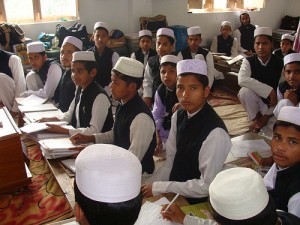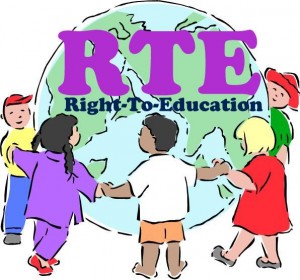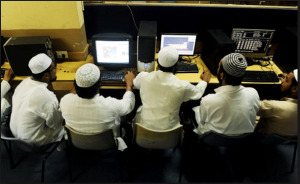In this blog Post, Abhiraj Thakur, Student NALSAR University of Law, writes about the legal issues that crop up when the state tries to intervene in religious matters of the citizens. This is with special reference to the state of Maharashtra, where last year the Government tried to modernize Madrassas[1].The blog also discusses how the Indian Media particularly the press portrays such incidents.
The recent decision by the BJP-Shiv-Sena led Maharashtra government to de-recognize Madrassas, which do not impart ‘formal education’ through the teaching of subjects like Maths, Science, etc., has received limited, but sensationalized coverage from newspapers. This decision brings several legal issues to light; the write-up shall analyze the following issues and compare these with the narrative of the Media:
- Do madrasas fall under the definition of a ‘school’?
- Is there any basis for State Intervention in Minority Educational Institutions?
- Does the government policy hold any moral or legal ground?
Newspapers have committed the fallacy of projecting this as a polarizing issue with two clear parties at odds—the Muslims and Hindutva outfits. An objective basis to examine the legal formalities that demand such a move by the government and a representation of the varying strands of opinion within the Muslim community itself is absent in the newspapers’ version. Nevertheless, this hostility to the government’s move has helped bring a few pertinent questions about the scheme to be responded to. In the course of the project, I will analyze the reasons and legitimacy to the government’s move, and proceed to highlight its consequences. This will be my critique of the media’s representation.
State Intervention and Cultural Relativism
Indian Press has been vocal in echoing the lament of the All India Ulema Council[2] and select Muslim leaders who have branded the move as a part of the BJP government’s ‘saffronization agenda’ and ‘intervention in the rights of minorities’.[3]
 The primary argument on which these claims rest is that the government needs to understand situations and practices in the context of one’s religion and culture. This refers to the theory of Cultural Relativism[4] propounded by Frank Boas and furthered by Ruth Benedict who states that ‘‘each culture is self-contained, autonomous, separate but equal and makes sense in its context’’.[5] Hence, the opponents of the move argue that a majoritarian view of ‘good education’ or ‘good curriculum,’ cannot be imposed and applied to every community.
The primary argument on which these claims rest is that the government needs to understand situations and practices in the context of one’s religion and culture. This refers to the theory of Cultural Relativism[4] propounded by Frank Boas and furthered by Ruth Benedict who states that ‘‘each culture is self-contained, autonomous, separate but equal and makes sense in its context’’.[5] Hence, the opponents of the move argue that a majoritarian view of ‘good education’ or ‘good curriculum,’ cannot be imposed and applied to every community.
However, there are several issues with the notion of cultural relativism itself, specifically in this context. As put forth by Kluckhohn, ‘‘the doctrine of cultural relativity—coexisting and equally valid patterns of life—precludes moral criticism of any cultural practice, including slavery, cannibalism, Nazism, or communism.’’ Secondly, it subjugates the recognition of some universal ethics and standards in society, which are treated as sacrosanct, regardless of relative standpoints.
The media has acted in haste and proceeded to criticize the government derecognition, ignoring the sociological factors that govern the decision to go to a madrasa in the first place.
- Irfan Habib argues how imparting solely religious instruction as a form of education precludes even the option for students passing out of madrassas to explore avenues of mainstream Western education.[6] And while the Madrassas may run the cultural relativity argument, the first and most basic necessity is for the parent or child to have the awareness and accessibility to other modes of schooling, so as to be able to give ‘informed consent’[7] to the traditional mode of education. Without the opportunity for quality mainstream education as set under the National Policy on Education 1992, the child/parent faces a decisional incapacitation from seeking an alternative route to education, and thereby, only religious instruction from a madrassa, is not a choice made from a religious or cultural standpoint.
The Rajinder Sachar Committee report made some observations regarding the low representation of members from the Muslim community in jobs both in the public and the private sector. The report concluded that one of the reasons for this is the low level of literacy in the community.[8] Madrassas mainly teach religious subjects and languages although many have added English, Hindi, and even computers to their curricula. But while religious education is rigorous, secular education is typically of a lower standard compared to regular schools with mathematics and science often getting a miss.
As the most viable way to uplift Muslims is through quality education, and therefore, it rests upon the state, core, not-derogate duty to afford every child, the opportunity to this quality education. This responsibility of the state to provide equal educational opportunity to every child regardless of his/her religion, is so fundamental, that incentivising adoption of the State curriculum by according recognition in return, can be justified.
Are Madrassas Schools?
Newspapers have painted a vivid and aggrandized picture of the consequences of the government’s decision. There has been the use of misleading headlines that portray it as a blanket de-recognition and misleading phrases like ‘cancellation of school statuses.[9] The move has been dubbed as ‘arm-twisting madrassas into modernisation’ and ‘outright stereotyping’.[10]
The primary concerns that the newspapers have raised are:
- Madrassas will lose their recognition as ‘schools’ and hence, the students receiving education there will be considered as ‘out of school.’
- Upon, de-recognition, Madrassas will become ineligible for State funding
 Firstly, to analyze how this de-recognition impacts Madrassas’ status as schools, I am going to start by questioning whether they were ‘Schools’ in the first place. ‘School,’ in Indian Law, is defined under Section 2(n) of the Right to Education Act ,2009. Madrassas, by virtue of being religious minority education imparting institutions, could be classified as ‘schools’ and so the provisions of the Act can hold. However, The All India Muslim Personal Law Board (AIMPLB) resisted the application of the Right to Education Act on Madrassas claiming it will destroy the madrassa system and violate Article 30 of the Constitution of India. Hence the HRD Ministry issued guidelines under Section 35(1) of the RTE Act affirming that the Act wasn’t applicable to Madrasass and Vedic Pathshalas.
Firstly, to analyze how this de-recognition impacts Madrassas’ status as schools, I am going to start by questioning whether they were ‘Schools’ in the first place. ‘School,’ in Indian Law, is defined under Section 2(n) of the Right to Education Act ,2009. Madrassas, by virtue of being religious minority education imparting institutions, could be classified as ‘schools’ and so the provisions of the Act can hold. However, The All India Muslim Personal Law Board (AIMPLB) resisted the application of the Right to Education Act on Madrassas claiming it will destroy the madrassa system and violate Article 30 of the Constitution of India. Hence the HRD Ministry issued guidelines under Section 35(1) of the RTE Act affirming that the Act wasn’t applicable to Madrasass and Vedic Pathshalas.
Further, the Supreme Court in, Society for Un-aided Private Schools of Rajasthan Vs. Union of India (UOI) and Anr.,[11] ruled that Madrassas were out of the scope of the RTE Act.
“It was pointed out that where the institution predominantly provides religious instructions like Madrassas, Vedic Pathshalas etc. and do not provide formal secular education, they are exempted from the applicability of the Act.”
These events recognized that Madrassas are not a part of the mainstream education framework of the country and hence, shall not function by the system of standards and visions set forth. Essentially, it segregated Madrassas from the class of ‘Schools’.
Secondly, the direct impact of the withdrawal of recognition to any educational institution is that it loses state funding and its degrees aren’t recognized. However, these concerns are invalidated by a review of the state of affairs prior to this policy.
 Yoginder Sikand makes a case worth considering in his book, ‘Bastions of the Believers’.[12] He informs the readers how; it was only those madrassas which followed the state prescribed syllabus that received any funds at all. This is based on the simple argument that the state can’t fund any activity without levying some accountability and standard of operation. Children who weren’t under the national curriculum were never considered ‘in school’. Moreover, due to a little applicability of religious education in modern day professional fields, the students studying in these Madrassas get absorbed as Muslim clerics or other positions in religious institutions. Even without a mandate by the government, for higher Islamic studies, the degrees awarded by madrasas were not recognized by Indian universities except in the respective theological departments of Aligarh Muslim University and Jamia Milia.
Yoginder Sikand makes a case worth considering in his book, ‘Bastions of the Believers’.[12] He informs the readers how; it was only those madrassas which followed the state prescribed syllabus that received any funds at all. This is based on the simple argument that the state can’t fund any activity without levying some accountability and standard of operation. Children who weren’t under the national curriculum were never considered ‘in school’. Moreover, due to a little applicability of religious education in modern day professional fields, the students studying in these Madrassas get absorbed as Muslim clerics or other positions in religious institutions. Even without a mandate by the government, for higher Islamic studies, the degrees awarded by madrasas were not recognized by Indian universities except in the respective theological departments of Aligarh Muslim University and Jamia Milia.
Thus, we can conclude the effect of such declarations by the State changes nothing to the disadvantage of madrassas. Newspapers have acted with high levels of legal illiteracy and projected this as an intrusive ‘change in policy’, failing to take note of how this move, in reality, is a declaration of an already existing policy. Hence, the offer by the Maharashtra Government to madrassas, to include Science and Maths and thereby receive recognition, funding, and accreditation, in my opinion, should not be interpreted as a move to derecognize and delegitimize religious education, but one as a correction of a past mistake, promotion of inclusive and creation of better opportunity for a regular Madrassa-going student.
[divider]
Footnotes:
[1] The Arabic word madrassa generally has two meanings: (1) in its more common literal and colloquial usage, it simply means “school”; (2) in its secondary meaning, a madrassa is an educational institution offering instruction in Islamic subjects including, but not limited to, the Quran, the sayings (hadith) of the Prophet Muhammad, jurisprudence (fiqh), and law
[2] As voiced by Maulana Mehmood Daryabadi, General Secretary of AIUC
[3] Eg: MIM President Asaduddin Owaisi, Samajwadi Party Leader- Abu Azmi
[4] The New Indian Express, (2015). Modern Edu Must to Ensure Govt Aid for Maharashtra Madrassas.
[5] The Concept of Race as Applied to Social Culture“, Howard Review 1 (1924): pp. 290-299
[6] Habib, S. (2015). Madarssas Do Need Modernisation, but Not in this Manner. [online] The Wire.
[7] Informed Consent refers to informed, voluntary and decisional capacitated consent and is often a legitimacy requirement for certain actions.
[8] Chapter 12, Para 3.1 ,Page 244, Recommendations contained in the Report of the High-Level Committee on Social, Economic and Educational Status of the Muslim Community of India headed by Justice Rajindar Sachar (Retd.)
[9] Aljazeera.com, (2015). Indian state de-recognises madrasa education.
[10] Borker, H. (2015). Maharashtra’s flawed focus on madrassas, The Hindu.
[11] AIR 2012 SC 3445- It was also noted that constitutionality doesn’t necessarily imply desirability
[12] Sikand, Y. (2005). Bastions of the believers. New Delhi: Penguin Books India
 Serato DJ Crack 2025Serato DJ PRO Crack
Serato DJ Crack 2025Serato DJ PRO Crack










 Allow notifications
Allow notifications


